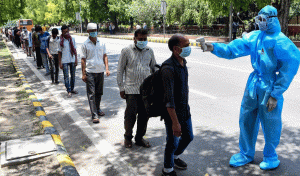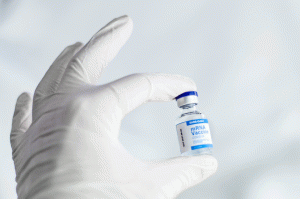Over 20 per cent of total Covid relief funding pledged in 2021 has been sent to India, according to Candid. Almost 50 grants and pledges worth a total of $285 million have been given to support India’s horrific Covid-19 resurgence, which began in April.
Candid, a non-profit that tracks and analyses global philanthropic funding, has been following Covid-19 relief over the past year. A report released in March 2020 found that more than $20 billion was pledged to pandemic support in 2020.
In 2021, it expanded its focus to look specifically at India, launching a Philanthropy in India database in partnership with Centre for Social Impact and Philanthropy at Ashoka University in February. In addition to tracking dollars donated, the database has also aggregated stories of giving and need in India.

Covid-19 temperature checks in May 2020 in India. Since then, the pandemic there has reached terrifying heights in a second wave. Image credit: Flickr.
A frightening second wave
After successful mitigation of Covid during the pandemic’s first year by social distancing and lockdown measures, India began facing a horrific second wave this April.
The country’s death toll has surpassed a quarter-million by official tallies, and currently accounts for 30 per cent of Covid-19 deaths worldwide. On Tuesday this week, the country recorded the world’s highest daily death toll with 4,529 deaths according to authorities. Experts believe that the true number of deaths and infections in India is even higher than reported.
Indian philanthropy response
For foundations within India facing the crisis, philanthropies have been moving swiftly to respond. According to Natasha Joshi at Rohini Nilekani Philanthropies, their foundation has told partners they can repurpose grants to meet the physical and mental well-being needs of their communities. The EdelGive Foundation in Mumbai has offered similar flexibility and support to their grantees.
Tata Trusts in India have been working extensively through the pandemic to support Covid relief, ranging from assistance for healthcare to migrant workers to remote education. According to Candid, Tata Trusts was one of the biggest Indian funders of Covid relief in India last year – with grants from Tata Trusts and the Azim Premji Foundation making up half of total funding pledged in response to the pandemic in 2020.
Azim Premji, the philanthropist behind the eponymous foundation, pledged to donate $3 million every day during India’s lockdown – so far he has given over $1 billion and earned the title ‘most generous Indian’ from a number of publications.
There has also been a surge of organised, community-driven relief work, both for individual, corporate, and philanthropic giving. Venture philanthropy fund Dasra and NGO Indiaspora, together with Indian organisations, have been raising funds for relief work – so far $2.9 million has been donated.
How did India get here?
Before the second wave broke out, India’s control of the pandemic was an example of the effect of lockdowns and social distancing. As recently as February, the country’s offical daily case count was about the same as New York state – despite being 50 times as populous.
‘There was a public narrative that India had conquered Covid-19,’ said Princeton University Epidemiologist Ramanan Laxminarayan to Nature.
In response, Indian Prime Minister Narendra Modi lifted virtually all restrictions at the start of 2021 and began holding large political rallies. India also celebrated a large religious festival that brought together tens of thousands of people.

India has been a major exporter of the vaccine, but will now be holding back doses for its own citizens. Image credit: Unsplash
Though a major vaccine producer for the rest of the world, India had a slow start to its own vaccination campaign. Starting in May, the vaccine has been available to everyone over 18. The country has also curbed the number of Covid vaccines that it exports, instead focusing on distributing those doses to citizens.
As the Covid case tally began to climb, the government has instituted lockdowns that are now starting to slow the virus’ spread in some areas. However, health officials warn that infection is still spreading unchecked outside of India’s major cities.
India has also been suffering an oxygen shortage, which international aid has rushed to fill. Planeloads of ventilators, medicines, and oxygen equipment began pouring into India at the end of April; yet much of the cargo has been sitting in airport hangars as hospitals call for more support, reported the BBC. The Indian government denies that there has been a delay.
More support on the way – or perhaps already there
According to Candid, its possible that more relief funding has been pledged to support India’s ongoing Covid crisis, and that data will become clear later once funders have reported their grants.
For more information on Indian philanthropy’s response to the pandemic, a recent podcast episode from the India Development Review interviewed Nachiket Mor, an expert and health systems design, and Dr Abhay Band, a public health expert with deep experience working at the grassroots, about the approach the country must take in fighting the pandemic’s deadly second wave.
Visit the Covid-19 resource page maintained by IDR.






Comments (4)
I personally admire those organisations and individuals from India who donated during the Pandemic or otherwise but overall despite our religious beliefs and culture encouraging philanthropy,it doesn’t come easily to most Indians as perhaps we have programmed ourselves to put our interests and even selfish needs first
People centred and Media Advocacy will be beneficial for vaccination coverage within a set timeline to reduce COVID-19 surges. Support to NGOs,CSO Non Frofit entity to clarify Myth and Misconception on vaccination is required apart from carried out responses to covid-19 pandemic.
Required Relief and Rehabilitation support for the Covid-19 affected people of Western Odisha including migrants and PVTG (indigenous people)
ONG REQUEST SUPPORT FOR SOCIAL PROJECT IN BRASIL.